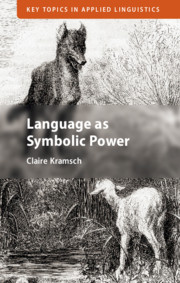Book contents
- Language as Symbolic Power
- Key Topics in Applied Linguistics
- Language as Symbolic Power
- Copyright page
- Contents
- Figures
- Acknowledgments
- Introduction
- Part I The Power of Symbolic Representation
- Part II The Power of Symbolic Action
- Part III The Power to Create Symbolic Reality
- Conclusion
- Glossary
- Endnotes
- References
- Index
Conclusion
Published online by Cambridge University Press: 15 October 2020
- Language as Symbolic Power
- Key Topics in Applied Linguistics
- Language as Symbolic Power
- Copyright page
- Contents
- Figures
- Acknowledgments
- Introduction
- Part I The Power of Symbolic Representation
- Part II The Power of Symbolic Action
- Part III The Power to Create Symbolic Reality
- Conclusion
- Glossary
- Endnotes
- References
- Index
Summary
The chapter summarizes the argument made throughout the book: Symbols mediate our relationship to physical facts and material culture; The use of symbols enables us to construct and thus manipulate social reality; Symbolic forms have symbolic functions that are multiple, changing and conflictual; Symbolic power can turn into symbolic violence; and Language as symbolic power has been transformed by the use of symbolic systems like the Internet. It then discusses the implications of viewing language as symbolic power both for applied linguistic research and for communicative language teaching. It reflects on the role symbolic power plays in educational practice and it examines the challenging issue of how to deal with politics in the language classroom and the ethical questions this raises. The chapter ends with an analysis of Toni Morrison’s Nobel lecture and her memorable statement: “We die. That may be the meaning of life. But we do language. That may be the measure of our lives.”
Keywords
Information
- Type
- Chapter
- Information
- Language as Symbolic Power , pp. 195 - 211Publisher: Cambridge University PressPrint publication year: 2020
